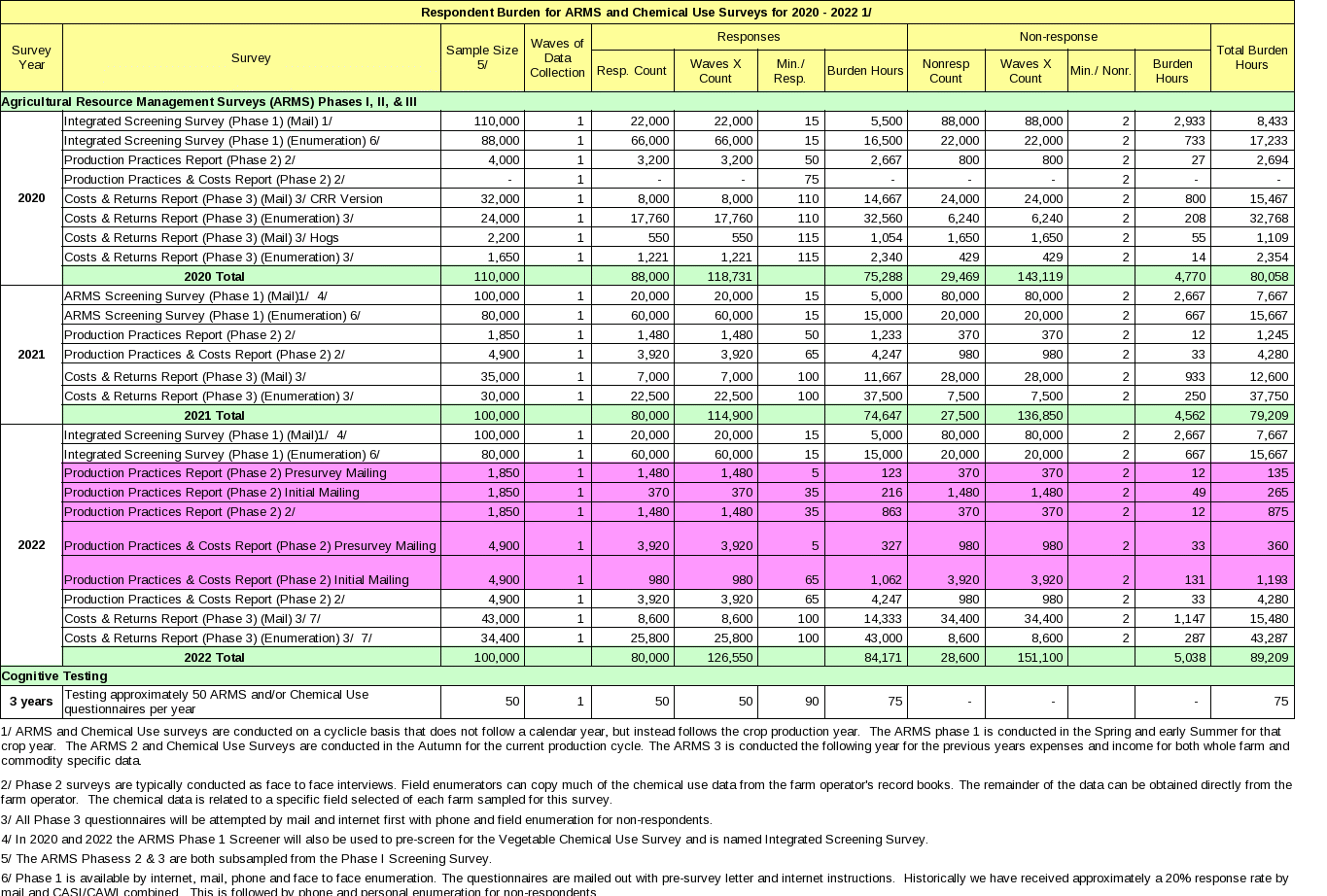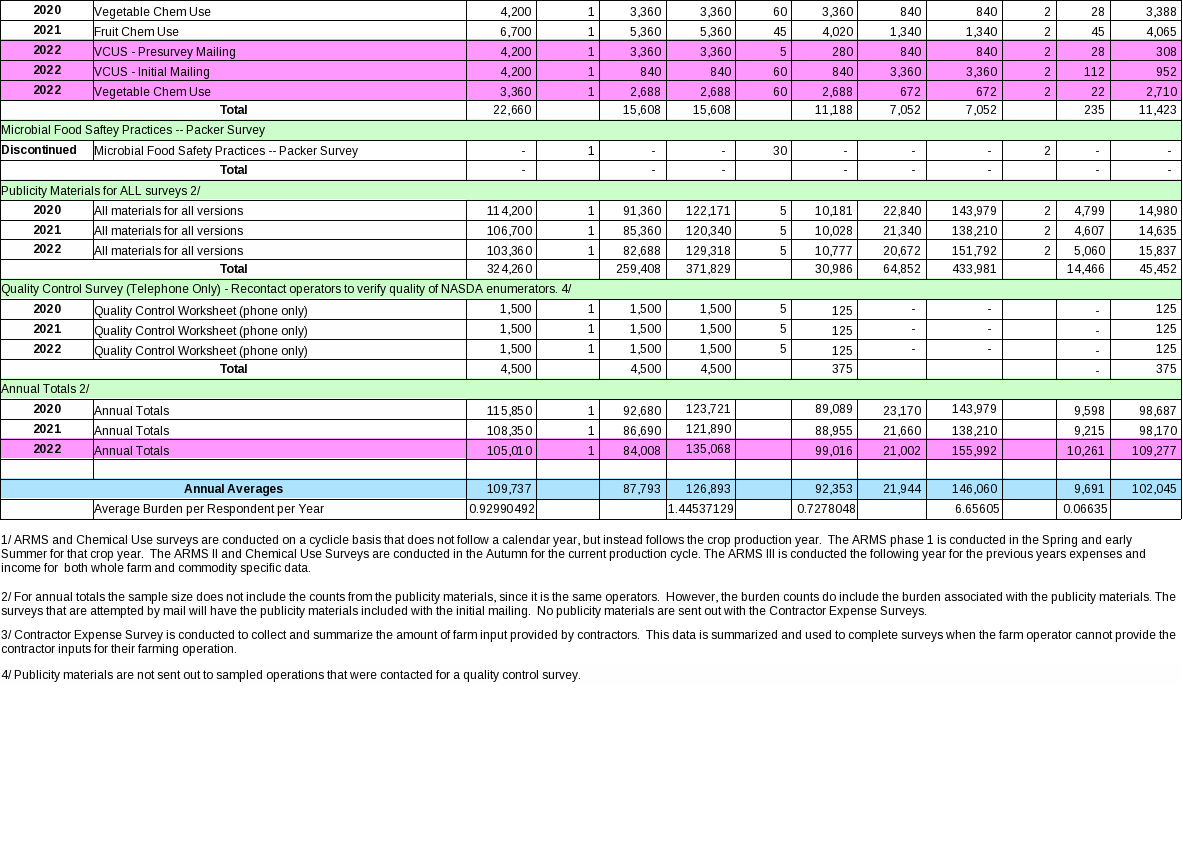Supplemental Supporting Statement Part A for Substantive Change July 2022
0218 - Substantive Change Request July 2022 - Supplemental Supporting Statement A for ARMS2 2022 - July 20, 2022.docx
Agricultural Resource Management and Chemical Use Surveys
Supplemental Supporting Statement Part A for Substantive Change July 2022
OMB: 0535-0218
SUPPLEMENTAL SUPPORTING STATEMENT Part A
Agricultural Resource Management and Chemical Use Surveys
Substantive Change
OMB No. 0535-0218
This substantive change is being submitted as a supplemental supporting statement for including the 2022 Agricultural Resource Management Surveys (ARMS) 2 and 2022 Vegetable Chemical Use Survey.
The most significant update from the 2017 Wheat PPCR is there will be only one combined wheat version instead of three different wheat versions (winter, Durum, and other spring wheat).
A. JUSTIFICATION
Circumstances making collection of information necessary.
NASS is requesting a substantive change to the ARMS and Chemical Use Survey docket (0535-0218) to accommodate the addition of the 2022 ARMS 2, and 2022 Vegetable Chemical Use questionnaires.
NASS conducts the ARMS program as a part of a cooperative agreement with the USDA Economic Research Service (ERS). The Costs and Returns (Phase 3) surveys collect both whole farm data and commodity specific data. The whole farm data can be linked to the cropping practices and chemical use data collected in the ARMS 2 phase. The majority of the questions that are asked in the Phase 3 surveys are a part of the ARMS core program and rarely have any changes made to them. The cooperative agreement allows ERS to ask additional research questions each year to address changes in the farming industry.
Historically, the majority of the surveys that are conducted under this OMB approval have been conducted by personal interviews. During the pandemic, NASS made changes to our data collection efforts to accommodate social distancing. If the current situation of the pandemic allows, NASS will resume personal interviewing using the National Association of State Department of Agriculture (NASDA) enumerators to collect the data. The surveys have been changed to allow for data collection by computer assisted web interviews (CAWI) and computer assisted telephone interviews (CATI). At this time, NASDA approved limited face to face enumeration by first phoning operators to schedule interviews and obtaining approval from the operator to engage in-person.
The substantive change request approved May 31, 2022 documents the plan for the 2022 ARMS and Chemical Use Survey Cycle

How, by whom, and for what purpose information is to be used.
There are no changes from the original approval for the purposes of the information collected.
Use of improved information technology.
Due to the COVID-19 pandemic and the need for social distancing, NASS added a Computer Assisted Telephone Interview (CATI) instrument with this particular group of surveys. In addition, NASS will be offering the ARMS 2 and ARMS 3 surveys as a Computer Assisted Web Interview (CAWI). NASS has also been developing a Computer Assisted Personal Interview (CAPI) instrument that will be available for use if it is safe to interview farmers in person.
4. Efforts to identify duplication.
There are no changes from the original approval related to duplication reduction.
Methods to minimize burden of small businesses.
With the use of the CATI, CAPI, and CAWI instruments, the incorporated screening questions and skip patterns should help minimize burden as much as possible.
Consequence if information collection were less frequent.
There are no changes to the frequency of these surveys than was originally approved.
Special circumstances.
No special circumstances are associated with this information collection.
Federal register notice and consultation with outside persons.
Not applicable.
Payments or gifts to respondents.
No payments or gifts will be given to respondents.
Confidentiality provided to respondents.
Confidentiality will be provided to respondents in accordance with the Confidential Information Protection and Statistical Efficiency Act of 2018, Title III of Pub. L. No. 115-435, codified in 44 U.S.C. Ch. 35 and other applicable Federal laws. All confidentially protections that are applied to all products released from these surveys will remain the same as originally approved.
Questions of a sensitive nature.
No questions of sensitive nature will be asked.
12. Hour burden and annualized costs to respondents.
This substantive change request results in an increase of 21,060 responses and 2,892 hours of burden. The new total is 291,060 responses and 109,277 hours.
Table 1

Table 2

Cost to the public for completing the questionnaire is assumed to be comparable to the hourly rate of those requesting the data. Using a fully-loaded wage of $36.97 per hour, the adjusted overall cost to the public for the 109,277 hours is estimated at $4,039,970.70.
NASS uses the Bureau of Labor Statistics’ Occupational Employment Statistics (most recently published on March 31, 2021 for the previous May) to estimate an hourly wage for the burden cost. The May 2020 mean wage for bookkeepers was $21.20. The mean wage for farm managers was $36.93. The mean wage for farm supervisors was $25.25. The mean wage of the three is $27.79. To calculate the fully loaded wage rate (includes allowances for Social Security, insurance, etc.) NASS will add 33% for a total of $36.97 per hour.
Total annual cost burden to respondents.
No start-up or ongoing operation/maintenance costs are associated with this information collection.
Annualized costs to federal government.
There are no changes to the total annual cost of $18,500,000 documented in the change request approved May 31, 2022 for the Agricultural Resource Management Surveys and the Chemical Use programs.
Reasons for changes in burden.
The removal of questions from the Production Practices Report (Potatoes) that were previously requested by the USDA Office of Pest Management Policy (OPMP) resulted in a decrease of 370 hours of burden with no change in number of responses. The removal of questions reduced the average time per respondent from 50 to 35 minutes.
The addition of presurvey and initial survey mailing for the Vegetable Chemical Use and ARMS 2 wheat and potato versions resulted in an increase of 21,060 responses and 3,262 hours.
Tabulation, analysis, and publication plans.
The changes to the questionnaires will be incorporated in the publications that are listed in the original approval docket.
Request for approval of non-display of expiration date.
No request is being made for approval of non-display of the expiration date.
18. Exceptions to certification statement.
No exceptions to the certification statement are requested.
July 2022a
| File Type | application/vnd.openxmlformats-officedocument.wordprocessingml.document |
| Author | HancDa |
| File Modified | 0000-00-00 |
| File Created | 2022-07-28 |
© 2026 OMB.report | Privacy Policy